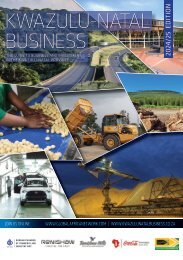Limpopo Business 2017-18 edition
A unique guide to business and investment in Limpopo. Limpopo Business 2017/18 is the ninth edition of this highly successful publication that has, since its launch in 2007, established itself as the premier business and investment guide to the Limpopo Province. This edition of Limpopo Business is officially endorsed by the Office of the Premier of Limpopo. This book contains detailed insights into the plans of the Limpopo Economic Development Agency (LEDA) and the recently launched bus rapid transport system for the provincial capital, Leeto la Polokwane, together with a comprehensive register of all provincial government and municipal contact details. Investment news related to mining, telecommunications and tourism is carried in overviews of all the main economic sectors. To complement the extensive distribution of the print edition of the magazine, the publication is also available online at www.limpopobusiness.co.za.
A unique guide to business and investment in Limpopo.
Limpopo Business 2017/18 is the ninth edition of this highly successful publication that has, since its launch in 2007, established itself as the premier business and investment guide to the Limpopo Province. This edition of Limpopo Business is officially endorsed by the Office of the Premier of Limpopo.
This book contains detailed insights into the plans of the Limpopo Economic Development Agency (LEDA) and the recently launched bus rapid transport system for the provincial capital, Leeto la Polokwane, together with a comprehensive register of all provincial government and municipal contact details. Investment news related to mining, telecommunications and tourism is carried in overviews of all the main economic sectors.
To complement the extensive distribution of the print edition of the magazine, the publication is also available online at www.limpopobusiness.co.za.
You also want an ePaper? Increase the reach of your titles
YUMPU automatically turns print PDFs into web optimized ePapers that Google loves.
INTERVIEW<br />
Localisation brings<br />
business opportunities<br />
Benford Mokoatle, Venetia Mine General Manager, details<br />
how new policies are creating jobs in the Musina area.<br />
Benford Mokoatle<br />
Will the underground mine project affect production levels?<br />
When you go underground you reduce waste but the ore mined will<br />
remain constant, if not marginally improve. The carats will marginally<br />
improve from the current production profile.<br />
What plans do you have to transition your workforce to<br />
the underground environment?<br />
The skills required for the underground operation will be completely<br />
different from the current skill levels and requirements. We can<br />
accommodate those who have an aspiration of going underground<br />
by retraining them.<br />
BIOGRAPHY<br />
Benford Mokoatle has 21 years<br />
of mining experience. He began<br />
his professional career in<br />
the Wits Basin and spent time<br />
in West Wits (Western Deep<br />
Levels and East Mine), the<br />
Free State (Tshepong Mine)<br />
and Vaal Reefs before joining<br />
De Beers. He has worked at<br />
Kimberley Mines, Oaks Mine,<br />
Voorspoed Mine and Venetia<br />
Mine. At Venetia Mine, Benford<br />
is responsible for leading and<br />
directing Venetia Mine and its<br />
leadership team.<br />
Does the investment in Venetia underground mine signify<br />
investor confidence?<br />
I have no doubt about that. This is a project of a minimum of<br />
US$2-billion. This shows that the investors have confidence first and<br />
foremost in the country, and secondly in the project itself. It also says<br />
that there is still a market in diamond sales.<br />
Does the mine impact on socio-economic development?<br />
In our region, for every employee that is employed there’s indirectly<br />
10 people that benefit. We are on a drive to localise businesses and<br />
suppliers that we do business with. We will continue to create partnerships<br />
and invest in the local economy.<br />
Are local companies benefitting?<br />
When we started with the BEE drive we needed to be doing business<br />
with empowered or black-owned suppliers. Now that we are at 88% or<br />
90% BEE credentials, we need to localise and do business with entities<br />
that originate from our labour-sending area. So far we have rolled out<br />
about 35 local business opportunities, 50 to 60% of those are sourced<br />
from our labour-sending areas such as Musina and Blouberg.<br />
49 LIMPOPO BUSINESS <strong>2017</strong>/<strong>18</strong>


















